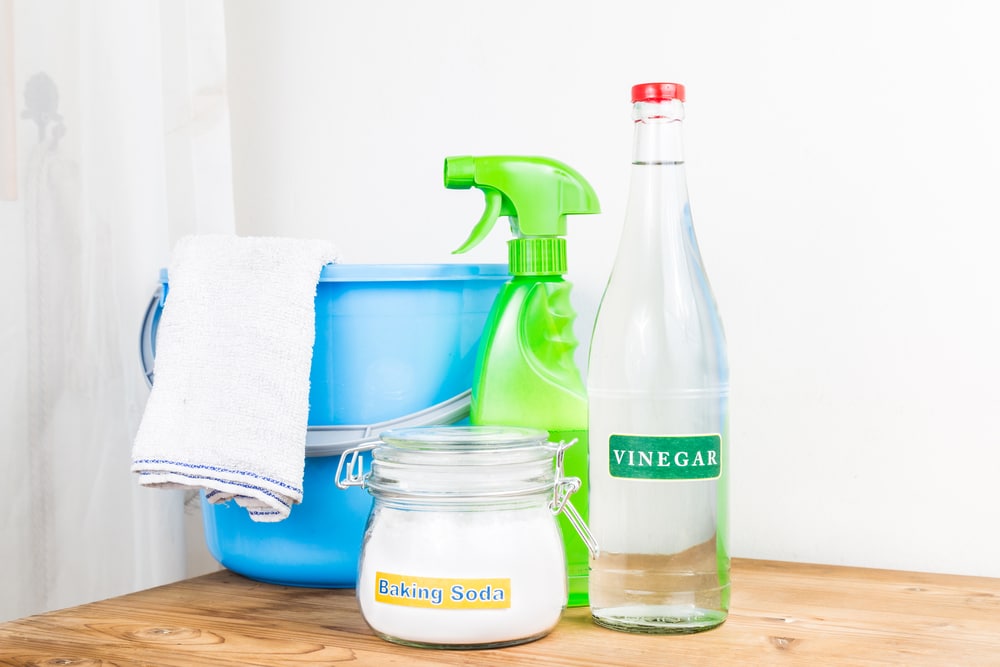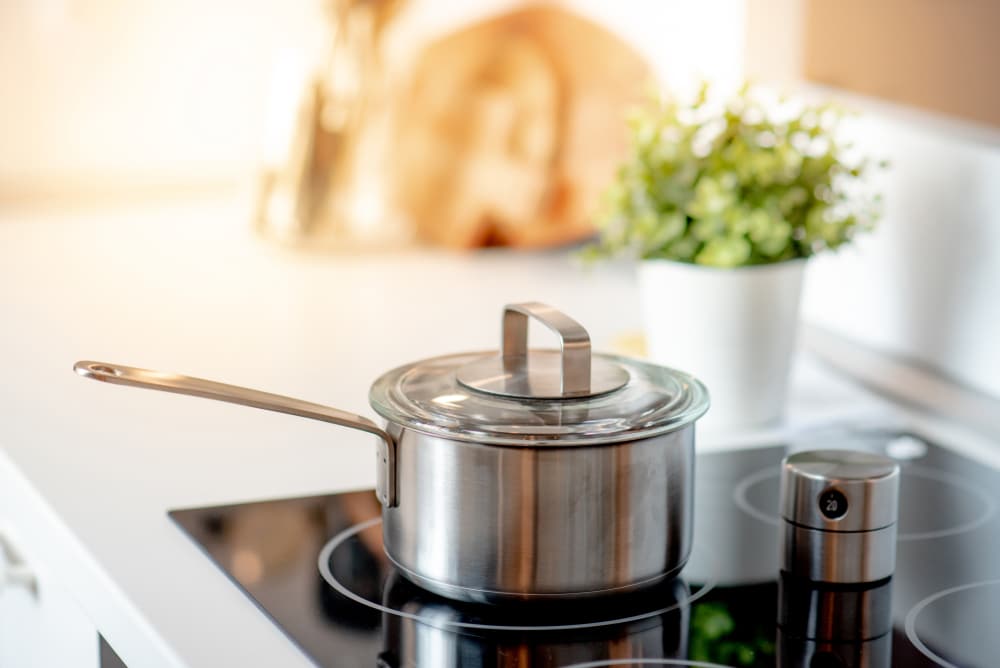Reading Time: 24 minutes
Updated 23rd April 2024
We could all do with cutting our household expenditure, so we’ve come up with 51 easy ways you can save money in your home. By making these tiny changes in your everyday life, you will notice a big difference. It’s a huge list, but every little saving adds up – even if you choose just a few to start with.
1. Raid the Kitchen for Cleaning Alternatives


Forking out for ‘miracle’ cleaners that don’t work is a pain. But there’s no need – have a go with an old-style cleaner instead. White vinegar unblocks sinks, removes limescale and cleans your worktops, and it works a charm to clean windows, too. All you need to do is mix it with a bit of water and a few drops of essential oil to mask the smell. If you have pets, make sure the essential oil you choose is safe for them (for example, cats can’t process lavender while dogs can’t handle teatree).
Bicarbonate of soda works on descaling teacups and teapots, gets rid of smells in your fridge and is a great microwave cleaner. For cleaning, just make a paste with a small amount of water, or mix with water and leave to soak for descaling.
2. Cheap Lick of Paint


Save money when sprucing up your house by checking out the ‘oops’ paints at DIY stores. These are paints left over from when the mixer doesn’t quite get the colour right. Some shades are not so nice, but you may find exactly what you’re after for half the price. You may also get lucky and find a really nice shade that is on sale.
If you only need to touch up a few bits here and there, or have a craft project such as turning that bland wooden mirror into something colourful, check out the tester pots. They’re more expensive per litre compared to a large tin, but if you’re only using a small amount it will save you a lot of cash.
3. Do a Mortgage Check
Mortgages have been hot news for the last few years as interest rates have been doing some… interesting things.
It looks like we’re due an interest rate cut in the near future, and if that happens it could be a prime time to remortgage your home if you’re out of your fixed term. Shopping around can save you thousands of pounds, while it could also reduce your overall mortgage term if you’re able to pay more each month than you currently do.
4. Put a Lid On It!


Save energy by always boiling pans with the lid on – it’ll use less energy and heat faster. If you’re an avid cook and want to save more money in the kitchen, consider a pressure cooker, which makes dishes like slow-braised roasts in a fraction of the time.
When it comes to pre-heating the oven, let’s be honest: you don’t always need to if you’re cooking a midweek dinner that’s not served up for guests. If you do pre-heat, don’t leave it for more than ten minutes (ideally five) to save energy.
5. Revive Carpets with Steam Cleaning
If your carpets are looking tired, they can be spruced up with some elbow grease – so don’t race to replace them at a small fortune just yet. Hiring a steam cleaner from somewhere like HSS is easy and costs around £30 a day, depending on where you live. This will give your carpets a serious deep clean and revive the pile.
For very busy families or messy households (usually those with fluffy pets), it could be worth investing in a wet/dry carpet cleaner to keep on hand like the Bissell SpotWash. This can also revive your sofas, mattresses, and soft furnishings, as well as your car interior.
6. DIY It


In a previous version of this article, we suggested taking a local DIY course for around £100 to learn the basics of being handy around the home. But the truth is, you can learn most things you need for free on YouTube and social media these days!
Before you call an expert, do a little online research. That dripping tap can be fixed with a washer, the strange cubby hole can have some custom-built shelves by your fair hand, or your bathroom retiling could revamp an entire room. Whatever you need to do, take some time to look online and learn what you can – it could save you hundreds of pounds. Some things, like electrics, we always recommend using an expert for, of course. But if you want to try and fix that wobbly stair bannister before calling a carpenter, look to YouTube.
7. Make a Shopping List
Some of us like to collect things, others have a penchant for fashion. Some love shiny jewellery, yet more can’t walk past a craft shop without picking up ‘supplies’.
When you go into the town centre, or the grocery store, make a list and stick to it. Only buy what you need – and if you pick up what seems to be ‘a bargain’, think long and hard whether you want this unplanned purchase.
Ask Yourself if You Really Need It, Already Have Something Similar, and Will Use It. These questions can help you control your spending during times of rising costs.
Batch cooking is a smart way to save money and time. When you come across a buy one get one free offer on essentials like chicken, beef mince, or vegetables, take advantage and stock up. By cooking extra portions and freezing them, you not only save money on discounted ingredients but also save time by only cooking once. This can help you avoid ordering takeout on busy nights, saving you around £50 a week or £2,600 a year.
Buying in bulk, batch cooking, and freezing meals can help you save money and time in the long run. It’s a great way to take advantage of discounts and avoid the temptation of ordering takeout when you’re too tired to cook.
To speed up drying time, consider using an outdoor line or heated airer before finishing off in the tumble dryer. If you prefer using the dryer, make sure to clean the lint screen and check the exhaust regularly to prevent obstructions that can prolong drying time and increase energy usage. Simply gather all your unwanted items and sell them at a car boot sale to make some extra cash. Whether it’s vintage vinyl, collectible toys, or last year’s wardrobe, apps like Vinted can help you sell them easily. This way, you can declutter your space and give your items a new life elsewhere. If you find yourself unable to resist buying books every time you walk past a bookshop, consider visiting your local library instead. Not only can you borrow books, but you can also borrow eBooks, CDs, DVDs, and even board games. Find your nearest library here.
Remember to only purchase items that you need and not just things that catch your eye while you’re out shopping. It’s easy to be tempted by bargains, but it’s not a good deal if you didn’t plan on buying it in the first place. If you don’t have a membership card or only need one for a special event, like Christmas, consider asking family and friends if they can take you along.
Additionally, keep your freezer stocked to make it run efficiently. Use ice cube trays or other containers to fill empty spaces in the freezer. Instead of buying new furniture, consider giving your old pieces a fresh look with a coat of paint and new handles. You can also explore upcycling furniture as a side hustle.
Opt for electronic statements and direct debits to save money on paper bills. Reuse fabric and towels for various purposes around the house, such as making new upholstery or dyeing towels to give them a fresh look. Check your council tax band to ensure you’re not overpaying, and regularly clean dust from radiators to improve heating efficiency.
Avoid ready meals and cook from scratch to save money and eat healthier. Keep track of your finances by checking receipts, bank statements, and bills regularly to catch any discrepancies. Be mindful of old direct debits that may still be active for services you no longer use. Stay on top of your finances to save time and money in the long run. One way to save money and prevent fraud is by regularly reviewing your transactions. By keeping an eye on your purchases, you can identify any unfamiliar charges and take action to stop any fraudulent activity. This simple practice can help you manage your finances more effectively and protect yourself from potential scams. following sentence:
The quick brown fox jumps over the lazy dog.
Revised: The fast brown fox leaps over the lethargic dog.

